

Jill Cochran, Staff Director, Subcommittee on Education, Training, and Employment, Committee on Veterans’ Affairs, U.S. House of Representatives

Representative Wayne Dowdy (D-MS), Chairman, Subcommittee on Education, Training, and Employment, Committee on Veterans’ Affairs

Representative Tim Penny (D-MN), Member, Committee on Veterans’ Affairs

Representative John Paul Hammerschmidt (R-AR), Ranking Member, Committee on Veterans’ Affairs

Representative Lane Evans (D-IL), Member, Committee on Veterans’ Affairs

Representative Christopher Smith (R-NJ), Ranking Minority Member, Subcommittee on Education, Training, and Employment, Committee on Veterans’ Affairs

Representative Beverly Byron (D-MD), Chairman, Military Personnel and Compensation Subcommittee, Committee on Armed Services

Representative Bill Gray (D-PA) Chairman, Budget Committee

Representative Leon Panetta (D-CA)

Representative Thomas Coleman, (R-MO)

Darryl Kehrer, 1992 Woodrow Wilson Public Service Fellow, Representing U.S. Dept. of Veterans Affairs

Senator John Glenn, (D-OH), Chairman, Subcommittee on Manpower and Personnel, Committee on Armed Services

John Marsh, Secretary of the Army, 1981-1989
SONNY’S SUMMARY
The House’s 401-2 passage of H.R. 1085 on March 17, 1987, and the Senate Veterans’ Affairs Committee’s February 26, 1987, 11-0 mark-up of S. 12 serve as backdrops to the Senate Armed Services Committee hearing held on S. 12 March 24, 1987.
At the hearing, Senators John Glenn of Ohio and Pete Wilson of California, Dr. Neil Singer of the Congressional Budget Office’s National Security Division, and the Reagan Administration continued to express various concerns about S. 12. Conversely, the veterans, higher education, and military personnel organizations supported it.
We’ll review several events that would lead to the full Senate Armed Services Committee’s April 30, 1987, 12-0 vote favorably reporting S. 12 to the full Senate.
These events included elements of the House lobbying the Senate, the Executive Branch lobbying the Legislative Branch, and one Senate committee lobbying another Senate committee. I use the term “lobbying” in this sense because each party aggressively attempted to persuade the other party toward its point of view, in support or opposition to S. 12.
Mr. Montgomery
March 24, 1987, marked an important fork in the long legislative road traveled by the Cranston/Murkowski S. 12 legislation that would create a permanent New GI Bill.1
That’s the day the Subcommittee on Manpower and Personnel, Senate Armed Services Committee, under the leadership of Chairman John Glenn and Ranking Member Pete Wilson of California, held a public hearing on S. 12.2
Senators John McCain of Arizona, Richard Shelby of Alabama, and Jim Exon of Nebraska served on the subcommittee and participated in the hearing. Senators Glenn and Wilson asked most of the questions.3
Ladies and gentlemen, please remember the Senate Committee on Veterans’ Affairs approved S. 12 on February 26, 1987, with minor amendments and filed its report on March 17.
But under Senate rules (the House has similar rules), the full Senate cannot consider the bill until Senator Glenn’s subcommittee and the full Senate Armed Services Committee mark it up (a phrase we learned earlier for approving it) and reports it to the full Senate.4 This is because the Parliamentarian referred S. 12 to both the Veterans’ Affairs and Armed Services Committees. Both committees had jurisdiction: Veterans’ Affairs regarding the GI Bill as a tool for transition from military to civilian life and Armed Services regarding it as a tool for recruitment/retention.
Let’s see what happened at the Subcommittee on Manpower and Personnel hearing. We’ll start with the views of Chairman Glenn.
Ms. Jill Cochran, staff director of my Subcommittee on Education, Training, and Employment, attended the hearing and prepared an informal summary for me.
I can tell you that working with my outstanding team of Veterans’ Affairs Committee Chief Counsel Mack Fleming and Deputy Chief Counsel Patrick Ryan, Communications Director Jim Holley, and staff assistant Beth Kilker and legislative assistant Candis Sniffen, Jill was my “eyes and ears” and sometimes even my “voice” for some five years on this bill. Richard Fuller was subcommittee staff director in that first year or two with Congressman Bob Edgar. They all labored on H.R. 1400 in the early years, carrying out a lot of research, analysis, staff negotiation, and plain hard work!5
I say Ms. Cochran was my “voice” because she drafted almost everything I would say on this issue for hearings, committee mark-ups, floor debate, letters, media interviews, and a lot more. That’s what staff do!
Ms. Cochran did it well. And with real commitment.6
Let’s ask Ms. Cochran to summarize.
Ms. Cochran

Jill Cochran
“Thank you, Mr. Chairman. At the hearing Chairman Glenn:7
• “Observed if we are going to have a New GI Bill, it should be structured at a benefit level that means something;
• “Expressed appreciation of former GI Bills and their contribution to society as a whole;
• “Said empirical data regarding increases in quality, longer enlistments in Reserve components, etc., cannot be specifically attributed to the New GI Bill;
• “Said he did not support the Department of Defense funding the New GI Bill instead of the Veterans Administration, which has done so since 1944; and

John Glenn
• “Said he didn’t think it necessary to reduce benefits for lesser terms of service.
“Ranking Member Wilson:8
• “Assumed the New GI Bill would have a negative effect on retaining quality service members; and
• “Seemed inclined to want to continue the New GI Bill test program rather than make the bill permanent.”

Pete Wilson
Assistant Secretary of Defense for Reserve Affairs Dennis Shaw testified on behalf of the Reserve components of the four services branches:9
“… We have compared the number of high school graduates we recruited in 1984 before the enactment of the New GI Bill for the Selected Reserve and the number we recruited in 1986. The difference was an increase of 34,500 high school graduates between those two years.
“So I think we can conclude that the GI Bill is having an impact for the Selected Reserve on the number of high school graduates, which is a quality indicator for that segment of our force.”
Here is a summary of the testimony of the Army, Navy, Air Force and Marine Corps witnesses. Go ahead Jill, please.
Ms. Cochran
“Regarding the service branches: 10
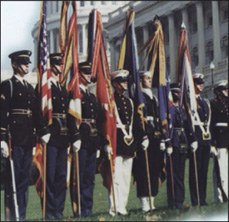
• “Each service branch testified in support of S. 12;
• “Each service branch agreed the VA should continue to pay for the education benefit and administer it; and
• “Lt. General Cheatham (Marine Corps) and Lt. General Hickey (Air Force) testified saying: ‘if it’s [New GI Bill] not broken, don’t fix it!’”
Mr. Montgomery
Dr. Neil M. Singer testified on behalf of the national security division of the Congressional Budget Office, known as CBO.
Dr. Singer focused mostly on cost projections.
Ms. Cochran
“Dr. Singer:11
• “Testified that the number of service members signing up for the New GI Bill was far higher than CBO anticipated;
• “Said cost of the benefit will be correspondingly higher, as well;
• “Preferred to continue the ‘test program’ so as to get more data; and
• “Felt the New GI Bill would have a negative effect on retaining service members beyond an initial term of service.”

CBO logo
Mr. Montgomery
Now you’ve heard the highlights from the body of testimony at the March 24, 1987, Senate Armed Services Subcommittee hearing.12
Again, I have such a high regard for Chairman Glenn I regret that—even though we reviewed and analyzed pretty much the same data—we evidently drew different conclusions from it.
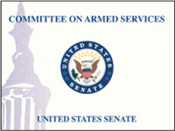
Chairman Glenn expressed concern that increases in recruiting numbers and in the quality of new enlistees could not specifically be attributed to the New GI Bill, in terms of empirical data.
As I saw it, the data cannot be sorted so specifically as to attribute behaviors with regard to joining the military to one factor alone. But the New GI Bill was the centerpiece of a recruiting package that needed to be held together.13
In February 1987, when our Veterans Affairs’ Committee Congressional Delegation visited the individual basic training sites of the four service branches, the recruits told us unequivocally getting money for college was a major factor—if not their main reason—in joining the military for two, three or four years.14
The full House overwhelmingly passed our bill containing 195 cosponsors by a vote of 401 to 2 on March 17, 1987. A wonderful day!15 We now had 21 more cosponsors than when we introduced the bill February 11. Members certainly can sign on to cosponsor a bill after it’s introduced.16
Here are some excerpts from the floor debate on the bill. We’ll hear from five members of the House Veterans’ Affairs Committee, including Representatives Wayne Dowdy of Mississippi, Tim Penny of Minnesota, John Paul Hammerschmidt of Arkansas, Lane Evans of Illinois, and Christopher Smith of New Jersey.
We’ll also hear comments of Armed Services Committee Subcommittee Chairman Beverly Byron of Maryland; as well as Representative Bill Gray of Pennsylvania, chairman of the Budget Committee; and Representative Tom Coleman of Missouri.17
As we learned in Chapter 4, in the House of Representatives, the presiding member sits in the Speaker’s Chair and is addressed during debate as “Mr. or Madame Speaker.” In the Senate, he or she is addressed as “Mr. or Madame President.”
Mr. Dowdy

Wayne Dowdy
“Mr. Speaker, I rise in strong support of H.R. 1085, as amended, which is sponsored by 195 of our colleagues.
“Clearly, this program is doing what its supporters said it would do. The New GI Bill is providing additional educational opportunities for hundreds of thousands of young people. It is also bringing smart, eager men and women into the armed forces.”18
Mr. Penny

Tim Penny
“Mr. Speaker, I rise in strong and enthusiastic support of H.R. 1085, the bill to make permanent the GI Bill. Our committee has watched the implementation of this program over the last couple of years and are tremendously excited about the success of the program.
“Mr. Speaker, I urge adoption of this legislation.”19
Mr. Hammerschmidt

John Paul Hammerschmidt
“Mr. Speaker, after our hearings on the New GI Bill and our trip to military facilities to obtain first-hand information about how the New GI Bill is working, the arrival of this day for final House approval of H.R. 1085 is almost anticlimactic.
“… I would like to point out that during the 20 years I have been a member of this great body I have never witnessed an event as occurred recently before the Subcommittee on Education, Training, and Employment. A speaker of the House had never in anyone’s memory come before our committee to testify on behalf of legislation.
“I was surprised and pleased when our friend and colleague, Speaker Jim Wright, made an appearance before us a few weeks ago to praise the GI Bill as ‘the best investment this country has ever made.’ His statement reflects his strong support for this legislation, and his unprecedented testimony reflects the great respect he and all of us have for our distinguished chairman, Mr. Montgomery.”20
Mr. Evans

Lane Evans
“Mr. Speaker, the New GI Bill is an overwhelming success.
“The New GI Bill is in the best tradition of America.
“During full committee consideration of this bill, I offered an amendment to honor the distinguished chairman of our committee whose vision, courage, and leadership are responsible for the New GI Bill’s success. My amendment was adopted, and the legislation which first established the New GI Bill is now [will be] known as the Montgomery GI Bill Act of 1984.”21
Mr. Smith

Christopher Smith
“Mr. Speaker, as the ranking minority member of the Education, Training, and Employment Subcommittee, I am very pleased that H.R. 1085—to make the New GI Bill permanent—has had strong bipartisan support and I’m very proud to be an original cosponsor of this legislation…. The GI Bill to the veteran is both a reward for service and a vital tool to prepare him or her for the future.
“… The cost-effectiveness of the GI Bill as a readjustment benefit alone has been amply demonstrated over the years in terms of additional taxes resulting from increased earnings by veterans who otherwise would not have attended college.”22
Ms. Byron

Beverly Byron
“Mr. Speaker, as the chairman of the Subcommittee on Military Personnel and Compensation of the Armed Services Committee, I rise in strong support of H.R. 1085 to make the New GI Bill permanent.
“There is no better investment in the future than education. America is what it is today because of the accomplishments of those World War II veterans who returned to college under the first GI Bill to become the scientists, engineers, doctors, teachers, and political leaders of their generation….
“In Title VII of the FY 1985 Defense Authorization Act—Public Law 98-525—Congress approved a three-year test of a new educational assistance program for both the active and Reserve components, funded jointly by the Veterans Administration and the Department of Defense. The test was an unqualified success….
“I urge my colleagues’ whole-hearted support.”23
Mr. Gray

Bill Gray
“Mr. Speaker, brain power is like a bank account. If you don’t put it in, you can’t draw it out. This legislation on the GI Bill will allow that brain power to come out for the betterment of our country and our service personnel.”24
Mr. Panetta

Leon Panetta
“… While expenditures on weapon systems are necessary to ensure our nation’s security, I have always felt that we must give first priority to our military people. In my view, we ought to be providing benefits which not only ensure their recruitment and retention, but will also give them the means of improving their quality of life.”25
Mr. Coleman

Thomas Coleman
“The New GI Bill program of educational assistance was established by the 1985 Defense Authorization Act to help service personnel readjust to civilian life and to help recruitment efforts and retention of personnel by the armed forces.
“It replaced the Veterans’ Educational Assistance Program [VEAP], under which participants contributed up to $2, 700 from their pay, which the Veterans Administration matched on a two-to-one basis. Unfortunately, the participation rate was less than 20 percent, taking into account those who requested refunds of their contributions.”26
Mr. Montgomery
“Mr. Speaker, I want to point out that I appreciate the kindness and the compliments accorded me in this debate. But I want to still say that there are many, many members of the House of Representatives and other laymen who have participated and made the bill possible. It is not one individual’s efforts. As I keep repeating, it has been a team effort all the way.”27
Ms. Byron
“Mr. Speaker, let me say in closing a debate that was supposed to be a very short and very quick one, but so many people wished to participate… it had to be extended… [that] I cannot really say that this has been a debate, because it really has not been. We are still waiting for those in opposition to show up and ask for time.
“I think I must say it has been more of a love-in. First, for a chance to talk about the Committee on Veterans’ Affairs Chairman, the gentleman from Mississippi [Mr. Montgomery], who, I think we have to say, is the father of this New GI Bill, but more important, for the future of the next generation with educational opportunities.
“As a new chairman of the Subcommittee on Compensation, Pension, and Insurance of the Committee on Armed Services,28 nothing has given me more pleasure than the first bill to come out of that subcommittee, to come out of the Committee on Armed Services this year, than the New GI Bill. I am glad to say it happened on my watch.”29
Mr. Montgomery
I want to pause and share with you three more everyday “realities” of policy making that emerge in this specific case from Darryl Kehrer, a 1992 Woodrow Wilson Public Service Fellow, representing the U.S. Department of Veterans Affairs:30
Mr. Kehrer

Darryl Kehrer
“Congress [of course] writes laws.
“But the first reality is that the Executive Branch ‘lobbies’ the Legislative Branch.
“The second is House committees ‘lobby’ Senate committees.
“And third, Senate committees ‘lobby’ one another!31
“Each entity—proponent and opponents—uses all of its persuasive power to ‘lobby’ the others, especially when enactment of legislation is imminent.”32
Mr. Montgomery

As one of the original group of Mercury astronauts, Glenn piloted NASA’s first U.S. manned orbital mission aboard Friendship 7 on February 20, 1962.
Here are some examples.
Senator Glenn, distinguished chairman of the Senate Armed Services Subcommittee on Manpower and Personnel, largely agreed with the late Senator Tower. John Glenn is an American icon and was indeed a major player in successfully offering his Citizen-Soldier GI Bill amendment to the FY 1985 Omnibus DoD Authorization Act. Observes Senator Glenn:
Mr. Glenn
“The fact is that there is considerable ‘economic rent’ in this program—we are offering a very attractive benefit to many people in order to get a marginal return on high-quality recruits.”33

Mr. Montgomery
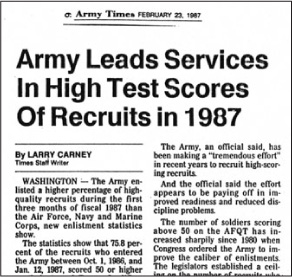
But the Army had the most challenging recruiting problem, and the Army respectfully did not share Senator Glenn’s view. Did you know John Glenn served with great distinction in the U.S. Marine Corps, flying combat missions during the Korean Conflict—long before the national Aeronautics and Space Administration (NASA) selected him as an astronaut?34
So here’s the first reality.
The Executive Branch—in the person of Secretary of the Army John Marsh—directly “lobbied” the Legislative Branch’s Senator Glenn and every member of the Armed Services Subcommittee he chaired, saying:
Mr. Marsh

John Marsh
“The New GI Bill test program is a winner for the soldier, the Army, and the nation…. In recent years, the quality of Army recruits has improved in terms of education and armed forces qualification test scores….
“This is due, in part, to improved recruiting incentives. Today, over 90 percent of Army recruits are high school graduates, compared to 54 percent in 1980.”35
Mr. Montgomery
And as we’ll learn in an Army Times article by Rick Maze later in this chapter, Chapman B. Cox, DoD top manpower official, will tell “military legislative liaison officers to quietly let Senators know that the Pentagon supported making the New GI Bill permanent….”36

Strom Thurmond
And the second reality is the House “lobbied” the Senate—not as part of a formal conference committee but on its own initiative.
I can tell you I was as nervous as a long-tailed cat in a room full of rocking chairs37 regarding my friend, the venerable Strom Thurmond of South Carolina. I contacted the Senator, a former paratrooper with the 82nd Airborne who landed near Normandy on the eve of D-Day.38
He was (Spring 1987) now having second thoughts on S. 12 to make the New GI Bill permanent, perhaps due to the program’s estimated cost.39 But both H.R. 1085 and S. 12 made New GI Bill benefits permanently available for members of the Guard and Reserve. I had a hunch this provision would interest Senator Thurmond, given his 36 years of service in the Army and Army Reserves, where he reached the rank of Major General.40
I called Senator John McCain (R-AZ) as well to ask him to oppose in the Manpower Subcommittee of the Armed Services Committee any efforts to continue to test the three-year New GI Bill program, rather than making it permanent. I was delighted Senator McCain said he’d take the lead in this regard.41 I used the word “test” because that’s how the Senate Armed Services Committee, in particular, viewed the New GI Bill.
Representative Marcy Kaptur also “lobbied” the Senate. In the next column is the May 7, 1987, letter Ms. Kaptur wrote to fellow Ohioan, Chairman Glenn, making the case for our bill.

Marcy Kaptur
In the letter, Ms. Kaptur addressed issues of retention, cost, and Reserve enlistments, and recruiting/youth employment/unemployment issues.42
Ms. Kaptur served with distinction on the Education, Training, and Employment Subcommittee. She wrote one of her Senators!
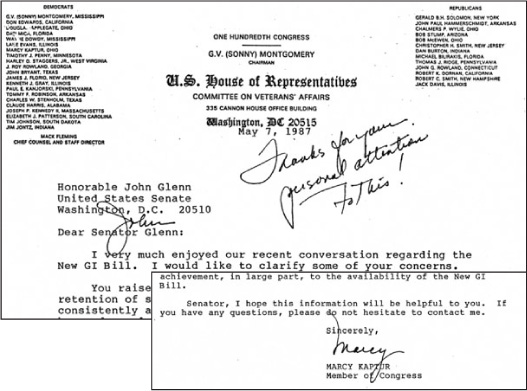

Among many others, my colleagues and I worked with the AACJC and the NCOA, which put a “full-court press” on the Senate Armed Services Committee.43

And third, committees “lobby” one another.
The Veterans’ Affairs Committee staffs of Senator Cranston “lobbied” the staff of Armed Services Subcommittee member Senator Edward Kennedy (D-MA), who had served as an Army enlistee in West Berlin….44
And the Veterans’ Affairs Committee “lobbied” the staff of Senator McCain, providing them with various manpower and recruiting analyses, some of which originated in the Pentagon.45

Ted Kennedy
Senators Kennedy, McCain, and Thurmond—a trio some staff light-heartedly referred to as the “unholy troika”46—helped shape the debate to allow the New GI Bill for the All-Volunteer Force to make it through the Armed Services Manpower/Personnel Subcommittee and the full committee, with continued leadership from committee member Senator Cohen.

John McCain
Here are the vote tallies.
In late April, by a vote of five ayes to two nays, Chairman Glenn’s Manpower and Personnel Subcommittee approved S. 12.47 And on April 30, the full Senate Armed Services Committee approved the bill 12-0.48 49
Let’s review the press release issued by Murray Flander on behalf of the Chairman, Senate Veterans’ Affairs Committee.50
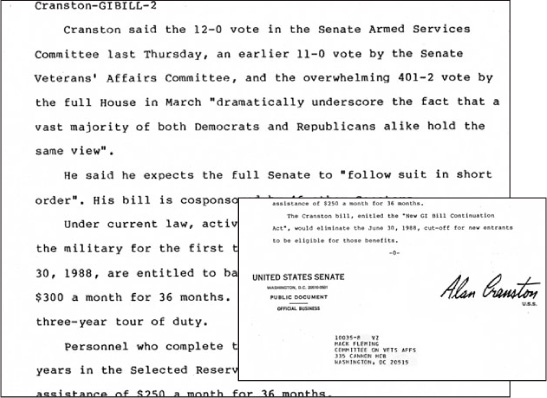
Mr. Flander
“Senator Alan Cranston (D-CA) predicted rapid Senate passage of his legislation making permanent the New GI Bill program of educational benefits following unanimous approval of the measure last week by the Senate Armed Services Committee.
“Cranston, the assistant Senate majority leader and chairman of the Veterans’ Affairs Committee, said today that ‘making the program permanent will enhance the ability of our armed forces to recruit, train, and retain the kind of top-quality people we need for a strong military defense.’
“He called the educational benefits provision in the New GI Bill ‘a blue-chip investment in our nation’s human resources.’
“Cranston’s bill, S. 12, which he introduced Jan. 6, the first day of the new Congress, extends indefinitely educational benefits for veterans and members of the National Guard and the Reserve. Under current law, the benefits are scheduled to expire in 1988.
“‘It is vital that we do everything necessary to make the All-Volunteer Force work and to avoid recourse to conscription to meet our military personnel needs,’ Cranston said.
“‘The last thing our nation needs—especially our young people—is a return to the divisiveness of the draft.
“‘I have long been convinced that education assistance, along with readjustment benefits for military personnel when they return to civilian life, are recruitment and retention tools for the all-volunteer armed forces,’ he said.
“Cranston said the 12-0 vote in the Senate Armed Services Committee last Thursday, an earlier 11-0 vote by the Senate Veterans’ Affairs Committee, and the overwhelming 401-2 vote by the full House in March ‘dramatically underscore’ the fact that a vast majority of both Democrats and Republicans alike hold the same view.”
From my vantage point, I’d say Senators Kennedy, McCain, and Thurmond, respectively, ended up supporting the bill for completely different reasons.51

Joe Kennedy
It appeared that Senator Kennedy provided important leadership in part at the behest of his nephew, Congressman Joe Kennedy of Massachusetts, a member of the House Veterans’ Affairs Committee.52
Joe is the son of the late Robert Kennedy, Attorney General of the U.S. from 1961 through 1964, and U.S. Senator from New York from 1965 through 1968. Senator Robert Kennedy died from an assassin’s bullet on June 6, 1968, in Los Angeles, while campaigning for the Democratic presidential nomination.53
I valued both Joe’s help and friendship.
Sonny’s Lessons Learned
The Executive Branch, too, is involved in writing laws.
In this case, the Executive Branch played a role in “lobbying” the Senate long after its witnesses first testified at a committee hearing. In a sense, the Executive Branch has no choice but to stay actively involved. Here are three generalized scenarios as to why:
First, if Congress has gotten the public policy correct, as expressed in the proposed legislation, the Executive Branch has to reinforce that policy so it continues unchanged.
Second, if in the view of the Executive Branch the policy in the bill is not correct, the Executive Branch has to try to make it right, because the Executive Branch obviously implements bills once enacted into law—being stuck with a bad law is no fun!
Third, the policies in the bill may be correct, but the bill may be administratively too onerous, cumbersome, or costly to implement.
WHAT’S NEXT
Let’s move now to the Senate chamber for the vote on S. 12, as amended.